This material was sent to us by our regular reader Sanzhar Surshanov (his Twitter @SanzharS), who shared very interesting ways to learn a new language for you.
Since the beginning of this year, I started learning French. I do this with the help of English, since I began to speak English confidently, I can say I have found the key to numerous Internet resources.
Below I want to list and describe how I am learning French:
The site was founded by the creators of CAPTCHA and RECAPTCHA, students of Carnegie Mellon University. By the way, every time you enter recaptcha, you help digitize thousands of old books. The main idea is for people to simultaneously learn languages and translate the Internet into different languages.
All the material is divided into different categories.
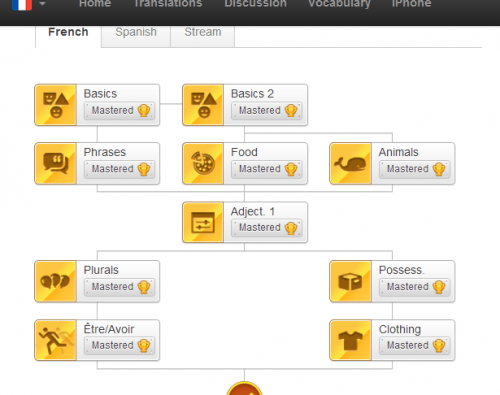
In each category, there are exercises.
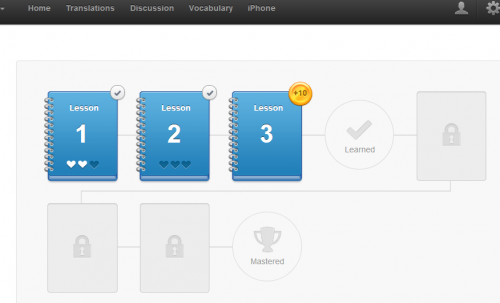
After you finish the exercises, you will be given real material taken from the Internet for translation. At first, simple sentences, as you study more and more complex. By translating sentences, you strengthen your knowledge and help translate web pages. You can also look at the translations of other users.
Exercises include text translations, speaking, listening. As such, there is no emphasis on grammar.
In addition to French, you can learn Spanish, German, English, Italian and Portuguese.
There are applications for iPhone, and in May of this year they promise for Android.
By the way, I recently read that learning Spanish with Duolingo can be much more effective compared to colleges and the Rosetta Stone program. You can read — here. Probably, this can be said not only about Spanish.
You can follow duolingo news on Twitter — @duolingo.
You can also watch the speeches of the creator of duolingo at TED:
Michel Thomas himself knows more than 10 languages and is known for teaching Hollywood stars.
You can buy or find Michel's audio lessons on the Internet, there are other languages besides French.
Audio lessons go like this: 2 students who do not know French come to him. It turns out that you become the 3rd student. Michelle is having a conversation with students and that's how they learn the language. He explains the difference between English and French, first tells about new words, then asks to translate from English into French.
The main difference and rule of Michel's method is — do not try to memorize words, phrases, etc.
I don't know how to explain it, but after the first lesson, on an intuitive level, you yourself begin to guess how it will be in the language being studied.
I personally really like this method.
To replenish my vocabulary, I use the memrise website.
On the site you can find a lot of different courses, you can even learn Morse code. I am studying Hacking French.
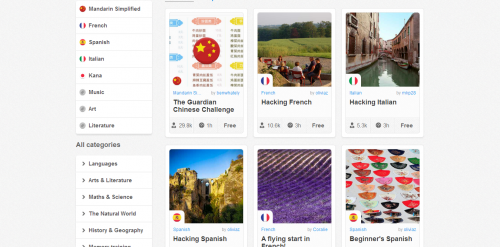
By learning new words, you «grow flowers». Plant seeds, water, etc.
The main trick is that you create memes for unfamiliar words and associate them with the English language. I didn't create the memes myself, I use the creations of other users.
You grow flowers like this: at the beginning you memorize the meaning of words, then repeat it repeatedly. Click on the correct answer, write the translation yourself, listening to the phrase, choose the correct answer from the list. This ends the first part.
After 4-5 hours, you receive an email notification that you need to repeat what you have passed. Repeat the above, if you make a mistake in the translation, the word goes to repeat. That's about how it all happens.
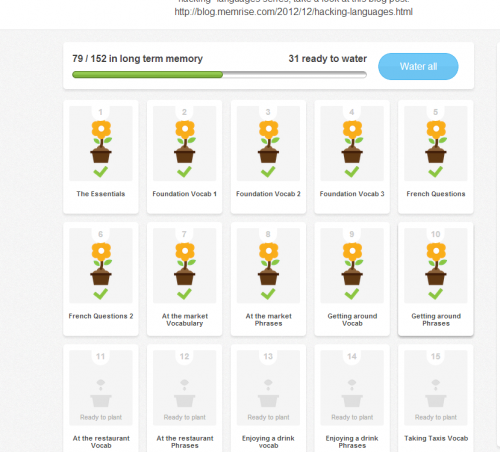
Thanks to Twitter, I just recently found a link to another wonderful resource.
Very cool website for French learners — newsinslowfrench.com/french-for-beg… They have grammar for beginners and News in slow french for intermediate
— Anna Ankona (@ankona) March 19, 2013
There are 30 acts in total, in each act there is a conversation between the teacher and the student. At the very beginning, the conversation is mostly in English, using a few French words. Further more. They promise that in the end all conversations will be in French only.
After the introductory speech, another conversation, there is already an emphasis on grammar. Then pronunciation, expressions, etc. Well, at the end you can take the test.

I have been using it for the third day and I am very satisfied.
If you have an iPod/iPhone/iPad, then you can find different podcasts for learning languages in iTunes. There is even a special section for French. I'm listening to — French for beginners.
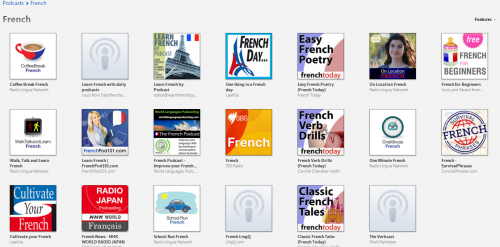
And finally… To learn a language, you need to practice every day, make it a habit. I try to give 20-30 minutes. Since all of the above is difficult to master for 30 minutes, I combine them. I listen to audio lessons on the road, and at home or duolingo, or memrise or, more recently? News in slow french.
From my experience of learning English (thanks to SDU Summer Language School), I know that you need to plunge into the language completely. Watch videos, movies and TV series with subtitles, then without. Listen to music with lyrics, audiobooks. Books for beginners, magazines, newspapers, ...
For example, now I watch almost all foreign TV series and movies in English. It's already a habit. You don't have to wait until one or another series is translated by tw.
Almost a month later I have to defend my diploma, so at the moment it is not always possible to systematically learn the language. I think it will be possible to do this more seriously in the summer.
P.S. I wanted to learn French as a child, probably the creativity of Alexander Dumas, Victor Hugo prompted me to do this, and reading Russian classics I often met phrases in this beautiful language. Since childhood, I wanted to, but prompted me to start this post here @freetonik.
If you have experience, tips on learning French or a new language in general, share in the comments. I will be only glad.